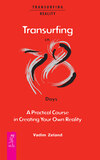Kitabı oku: «Reality Transurfing: steps 1-5», sayfa 9
Superiority and Inferiority
Feelings of superiority and inferiority are indicative of dependent relationships. When you compare your own qualities to those of others you inevitably create excess potential. On an energetic level it makes no difference whether you express you superiority publicly, or just secretly congratulate yourself on being better than others. Quite obviously, open expressions of superiority cause others to dislike you. People who make comparisons are often striving to artificially boost their own ego at the cost of others. This kind of behaviour always creates excess potential, even if it is just a shadow of the arrogance that is not expressed openly, and balanced forces will come in with a slap.
People compare themselves to the world around them as a means of establishing a sense of their own self worth. However, this type of self-assertion is as illusory as a fly trying to force its way through a pane of glass when the window next to it is wide open. When a person strives to prove their importance to the world, energy is wasted on supporting excess potential. Working on self-development, on the other hand, creates real virtues; no energy is wasted and no harmful excess potential created.
You might think that the amount of energy spent on making a comparison is minimal. In actual fact the energy involved is more than enough to support a relatively powerful charge of excess potential. What determines the charge is how you direct your energy. If your goal is to develop certain qualities in yourself then this intention will propel you forwards. If however, your goal is to demonstrate all your ‘regalia’ to the rest of the world, you wheels will spin helplessly as if caught in a deep rut, going nowhere but creating an irregularity in the energy field. The world will be ‘stunned’ by the shining regalia and balanced forces will take effect. The forces do not have a lot of choice. They can either freshen up the colours of the external world which has been paled by comparison, or reduce the shine of the misplaced star. The first option is of course far too labour intensive and so it only leaves the second. Balanced forces have numerous ways of doing things. They do not have to deprive the ambitious star of its regalia. They can simply send them an unpleasant situation to bring them down a peg or two.
We often perceive problems, obstacles and misfortune to be integral parts of the world we live in. No-one is at all surprised that difficulties, small and large, accompany them throughout their lives. We have all adopted the view that this is the way of the world. In actual fact, misfortune is an anomaly and not a normal phenomenon. Often it is not possible to find a logical explanation for why a problem occurred and why it happened to you in particular. The majority of unpleasant moments we experience are generated by the actions of balanced forces as part of their function in eliminating excess potential created either by you or those in your immediate environment. Most people are unaware of the fact that they have created excess potential and that balanced forces exist and so interpret the problems they face to be the manifestation of some unavoidable dark force.
You can eliminate the majority of the problems you usually face if you relieve yourself of the colossal effort of supporting excess potential. A huge amount of energy is wasted on excess potential that often produces a result which represents the complete opposite of your original intention. To free yourself from the action of balanced forces you have to stop buzzing like a fly against a pane of glass. Switch your intention from increasing your own sense of self-importance to developing the qualities you admire.
You also have to let go of any lurking idea that you are capable of controlling the external world. Irrespective of your place on the social ladder, if you believe you can manipulate the world around you things will definitely go wrong because attempts to change the world destroy the balance. Interference with the workings of the world has a negative affect on the interests of the majority. Transurfing enables you to choose your destiny without compromising anyone else’s interests. This is ultimately much more effective than storming ahead and overcoming all the obstacles in your way. Your fate is truly in your hands but only in the sense that it has been given to you to choose it rather than change it. Many people have suffered failure because they have taken the idea of creating your own destiny literally. There is no place for battle in Transurfing, so you can lay down the weapons of war with relief.
Refusing to behave with superiority has nothing to do with self-deprecation. Belittling your own worth is just the other side of the coin. On an energetic level it is irrelevant which extreme of the complex you embody. The size of the potential created is in direct proportion to the extent with which a person’s evaluation of the world differs from reality. When balanced forces encounter self-importance they knock it off its pedestal. In the case of an inferiority complex they force a person to raise their falsely reduced sense of worth. Balanced forces act directly and without concern for the subtleties of human relationships, and so often, once they start having an impact, a person begins to act less naturally, highlighting the aspects of themselves they would prefer to hide all the more.
For example, teenagers can be defiant as a way of compensating for their feelings of insecurity. Shy people can act in an overly overt fashion in order to hide their shyness. People with low self-esteem want to put their best side forward and so often behave in a manner which is affected and tense, etc. Whatever your psychological make-up, trying to battle against a complex can be more complicated and lead to more unpleasant consequences than the complex itself.
As you know, trying to hide a complex or battling against an inferiority complex is futile. The only way of mitigating its consequences is to eliminate the complex altogether which is no easy task. There is no point in repeatedly telling yourself that everything is wonderful because you cannot fool yourself. The slide technique can be helpful though and we will come to that later.
At this stage it is enough to establish the fact that a preoccupation with your own shortcomings in comparison to the qualities of others has the same effect as desiring to illustrate your comparative eminence. The result will be the opposite of what you originally intended. Do not think that others around you attribute to your shortcomings the same meaning that you do. Everyone is mostly concerned with themselves, and so you can freely relieve yourself of a huge burden. Excess potential will dissipate, balanced forces will cease from accentuating the situation and the freed energy can be used for self-development.
Rather than fighting your flaws or trying to hide them, they can be compensated for with other qualities. Charm can compensate for a lack of physical beauty. There are people who are relatively unattractive in their external appearance but who enthral others with their words. Self-confidence also compensates for physical flaws and many great historical figures were no picture to look at!
The inability to communicate freely can be compensated for by being a good listener: As the saying goes “They’re all lying, but it doesn’t matter because no-one is listening”. Your eloquence may interest people but only to a lesser degree. Everyone, just like you, is focused on themselves and their problems and so a good listener who will let you pour your heart out to them is a real treasure. To those who are genuinely shy, take my advice; guard this quality like a precious jewel. Believe me, there is a hidden charm to shyness. When you let go of fighting your shyness it will stop coming across as clumsiness and you will notice how people begin to find you more attractive.
Here is another example of how one quality compensates for another. The conditioned need to “be cool” often causes people to imitate those individuals who have already achieved the status of being “cool”. To mindlessly copy someone else’s script creates nothing more than a parody. Everyone has their own script. All you need to do is choose your own credo and live by it. To imitate others in an attempt to gain the status of being “cool” is like using the method of the fly beating itself up against the window pane. For example, in a group of teenagers the leader will be the one who lives according to their own beliefs. The leader is therefore free not to take advice from others on how they should act. The leader does not need to imitate anyone; they simply have a worthy opinion of themselves. They know what they are doing; they do not need to suck up to anyone or prove anything to anybody. The leader is therefore free of excess potential and receives the deserved advantage. In any group the leader is always the person who lives according to their own beliefs. When a person has freed themselves from the burden of excess potential they have nothing to prove. They have an inner freedom, are self-sufficient and have more energy than those around them. These qualities give them the advantage of becoming leader.
Can you see where the open window is? Maybe you think that these types of dynamic do not concern you and that you don’t suffer from issues like these. Do not deceive yourself. Everyone to some degree or another has a tendency to create excess potential in the energy fields around them but if you follow the principles of Transurfing, complexes of inferiority or superiority will simply vanish from your life.
Love to Have, Love to Hate
“I want, never gets!” There is truth in this childhood admonition although here I would rephrase it slightly to: “The stronger you want something the less likely you are to get it”. When you want something so much that you are willing to place everything on the cards to get it, you create huge excess potential which destroys balance. Balanced forces can then throw you onto a life line where there is no trace of the object you desired.
On an energetic level, a person obsessed with desire is like a wild boar trying to catch a blue bird. The boar wants the bird badly, licking its lips, snorting loudly and rooting the ground in anticipation. Naturally, the bird flies away. If on the other hand the boar had simply wandered around somewhere nearby as if indifferent it would have had a good chance of grabbing the bird by the tail.
There are three types of desire. The first is when a strong desire transforms into the determined intention to have something and do whatever is required to get it. Then the desire is fulfilled. The potential created by the desire is dispersed because the energy behind it is fuelled into action. The second type of desire is inactive and tormenting and represents excess potential in its purest form. It lingers in the energy field. In a best case scenario, it wastes the energy of the suffering carrier, and in a worst case scenario attracts all kinds of unrelated problems.
The third kind of desire is the most insidious. This type of desire becomes dependent on the object of the desire. Attaching great significance to the desired object automatically creates a dependent relationship and strong excess potential, which in turn calls into effect equally powerful balanced forces. Usually, the person’s thoughts run along the lines of: “If I achieve this, my situation will improve dramatically”, “If I don’t achieve this, my life will lose all meaning”, “If I do this, I’ll prove to myself and everybody else what I’m worth”, “If I don’t do this, I’m worth nothing”, “If I got this, it would be great”, “It will be terrible if I don’t get this”; and so on. Once you become dependent on the object of your desire you are drawn into such a violent whirlpool that you will exhaust yourself in the struggle. Eventually, when you realise that your efforts have led to nothing you will let go of the desire. Balanced forces will have restored equilibrium remaining completely indifferent to your suffering and all because of a strong attachment to the fulfilment of a desire. This is what happens when a desire is placed on one dish of the scales and absolutely everything else is piled on the other.
Only the first type of desire can be fulfilled because desire is transformed into pure intention free of excess potential. It is a common view that there is no such thing as a free lunch and everything has to be paid for. In truth, we pay only for the excess potential we create. In the alternatives space everything is free. Since we are already using these terms, it could be said that absence of importance and dependent relationships are a kind of payment for the fulfilment of desire. The energy of pure intention is all that is required for you to transfer to a life line where the object of desire becomes a part of your reality. We will return later to the subject of intention. For now, we will simply note that pure intention is desire and action without the attribution of importance. For example, going to the shop to buy a newspaper is a pure intention because it is in no way inhibited.
The greater an event is valued the more likely it is to fall through in some way. If you attribute huge value to what you have, sooner or later balanced forces will take it from you. If what you want to receive is hugely important to you there is very little chance of you actually getting it unless you lower the stakes.
For example, you are mad about your new car. You blow the dust off it, cherish it, fear it may get scratched and generally worship it. The huge value you place on your car creates excess potential because in the reality of the information field its true meaning is close to nil. Balanced forces will soon find a clumsy driver to cripple your car or you may bump it somewhere by being overly cautious. All you have to do is level out your attitude towards it, treat it as the relatively ordinary object that it is and the chances of it being damaged will be sharply reduced. Treating your car as something ordinary does not mean carelessly. You can take perfectly good care of a car without idolizing it.
There is another aspect to the dynamics of strong desire. A lot of people believe that if you want something badly enough, you will get it. This would suggest that strength of desire can bring you onto a life line where your desire will be fulfilled but that is not the case. If your desire has become dependent, like a kind of psychosis, or you are hysterically driven to obtain something whatever the cost, then somewhere deep down inside you do not really believe that you can achieve it. This creates “strong interference” in the thought energy you are transmitting. If you do not truly have faith in something, you will try really hard to convince yourself that you can achieve what you want, thereby boosting the level of excess potential even more. With this kind of dynamic there is a risk that your “life-work” could actually take you all your life to achieve. All you can do is reduce the significance your aim has for you personally and set about achieving what you desire in the same manner as you would if you were go to the shop to buy a newspaper.
The strong desire to avoid something is a logical continuation of being dissatisfied either with yourself or with something in your environment. The greater the negative attachment, the more powerful the excess potential will be. The more you want to avoid something the greater the probability that you will experience it because balanced forces have no attachment to the means of restoring balance. They simply have two alternatives which are either to draw you away from encountering the thing you want to avoid or to bring you into contact with it. It is better to consciously stop negating things in your environment so that you do not create excess potential in the first place. But this is not the only consequence of strong negative attachment. When you think about the thing you are negating you radiate energy at the frequency of a life line where that thing is present. You always get the things you love to hate.
In reality, this is what happens when you actively desire for something not to happen. Imagine a man attending a grand reception at an embassy. The atmosphere is formal, refined and sedate. Then the man starts waving his hands about uncontrollably, stamping his feet and screaming desperately how much he would hate to be forced to leave immediately. Naturally, the security guys would appear forthwith, grabbing the strange guest under the arms. The man whines and tries to resist but is nonetheless swiftly escorted out of the building. This is, of course, an exaggerated picture of reality, but on an energetic level the dynamic of negative attachment has the same level of force and intensity.
Let us take another example. In the middle of the night you are woken by your noisy neighbours. You really want to sleep because you have to go to work in the morning but it seems like your neighbour’s party is just getting going. The more you want them to stop the more likely the party is to go on for some time. The angrier you get the noisier the party becomes and if you start to hate your neighbours with intensity you can guarantee that late night parties will become more frequent. To solve the problem you can apply the method of defeating or stopping the pendulum. You will stop the pendulum’s sway if you choose to see the situation as a parody. You could also ignore the situation, refusing to show any sign of interest or emotion. Then the pendulum will be defeated and no excess potential is created. Take comfort in the awareness that you have freedom of choice and that you know how to use it. Soon the neighbours will settle down. This is how it works. Try it out for yourself.
Now you can think back and recognise what things in your life you have attributed excessive importance to and what problems you came up against as a result. If things are genuinely awful, let go of the idea of their importance totally; shake loose your dependency on the situation and start transmitting positive energy right away. The worse things are now, the better, as this will enable you to assess how the technique works if you feel that you have suffered great loss. Take heart! In this situation, balanced forces are on your side because their task is to compensate bad with good. Things can no more be bad all the time than they can be good all the time. No-one can ride the wave of success all their lives. This is what it would look like on an energetic level if you were to re-attune your energy in this way. Imagine you were attacked, abused, beaten up and everything you had on you was taken, and then all of a sudden, you were shoved a bag which turned out to be full of money. The more you were wounded, the greater the amount of money in the bag there would be.
Guilt
Guilt is pure excess potential. In nature there are no notions of good and bad. For balanced forces both good and bad deeds are equivalent. The important thing in either case is to restore balance if excess potential arises. If you have behaved badly, became aware of it and then started to feel guilty (I should be punished) you will have created potential. If you have acted well, become aware of it and started feeling proud of yourself (I should be rewarded) then you will also have created potential. Balanced forces have no concept that some things should be rewarded and others punished. They simply eliminate inhomogeneity in the energy field.
The payment for feelings of guilt will always be punishment in one form or another. If you do not feel guilty then punishment might not be forthcoming. Unfortunately, feelings of pride that you experience when you have done something good will also lead to punishment rather than reward because the purpose of balanced forces is to eliminate the excess potential of pride, whereas a reward would only enhance it.
An induced feeling of guilt, i.e. guilt you feel when “proper” people are expecting you to feel guilty, creates excess potential squared. As well as your own conscience bothering you, you also have to bear the anger of the righteous as well. Finally, the greatest excess potential is generated by people who experience unwarranted feelings of guilt caused by an innate tendency to “always take the blame”. In this case, there is absolutely no point in suffering pangs of conscience, because the reason for the guilt was made up in the first place. Having a guilt complex can ruin your life because you will be constantly subject to the impact of balanced forces appearing in order to eliminate the bias of guilt for imagined crimes.
There is a truth in the saying: “Impudence is second happiness”. In general, people whose conscience does not bother them are not affected by balanced forces even if they have committed a wrong doing. It would be great if God automatically punished all villains and culprits. Justice would prevail and evil be overcome. Nonetheless, there is no ‘justice’ as such in nature and so, sad as it may be, the opposite happens; decent people who have an inherent feeling of guilt are the ones who constantly face misfortune, whereas the shameless and the cynical often go through life not only unpunished, but successful.
Feelings of guilt will always produce a script that includes punishment whether you are conscious of what is happening or not. Your subconscious follows the script and makes you pay. In a best case scenario you will get away with a few cuts or bruises, or some kind of problem will arise. In a worst case scenario, you could have an accident with serious repercussions. This is what the feeling of guilt does. It brings nothing useful or creative, only destruction. It is better to avoid doing anything that would later cause you to feel guilty than to torture yourself with a guilty conscience. Once you can say to yourself that you have not actually done anything wrong it is totally futile to continue torturing yourself with a guilt complex. The feelings you suffer will not benefit anyone, least of all you.
The Ten Commandments are not so much morals in the ethical sense as recommendations for how to maintain balance. It is we with our basic childlike outlook who have interpreted the Commandments as if they were our mother warning us not to be naughty, otherwise she will make us stand in the corner. On the contrary, nothing is said about punishing people who get up to a little mischief. People create their own problems by destroying the balance. The Commandments are simply a warning.
As we said earlier, guilt is like a thread that pendulums, and especially manipulators, can use to control you. Manipulators are people who act according to the construct of: “You have to do what I tell you to now because you are guilty” or “I am better than you because you are in the wrong”. A manipulator tries to impose a feeling of guilt onto their “charges”, to gain power over them, or for their own self-assertion. On the surface these people can seem very “proper.” In their view, what is good and what is bad was established long ago. They always say the right thing and their actions are impeccably correct.
However, in fairness it should be said that not all people who are respectable and decent have a tendency to manipulate. The need to lecture and guide is a consequence of doubt and uncertainty that plagues a person’s soul. They skilfully hide their inner struggle from themselves and those around them. Lacking the inner strength that truly decent people possess, the manipulator seeks self-assertion at the expense of others. The need to lecture and control stems from the desire to strengthen their own position, which they do by belittling their adopted ward. Thus, dependent relationships are created. It would be wonderful if balanced forces could make sure that manipulators got what they deserve. However, excess potential only arises where there is tension and a build-up of energy. In this case, there is no build up of excess potential because the ward gives their energy to the manipulator creating a flow. As a result, the manipulator stands uncorrected.
As soon as a person indicates that they are willing to absorb guilt, a manipulator will stick to that person like glue and feed on their energy. This dynamic can be avoided simply by refusing to take on feelings of guilt. You do not have to justify yourself to anyone and you do not owe anybody anything. If you are to blame for something then you can accept the punishment, as long as you do not get stuck in the position of the guilty party afterwards. You do not owe those close to you anything either; after all, you care about them because you love them not because you have been coerced into doing so. This is a completely different matter. If you have a tendency to justify yourself, start letting go of it; once manipulative individuals realize they no longer have a way of hooking into your energy they will leave you alone.
Guilt goes hand in hand with an inferiority complex. If you feel inferior in any way it is because you have compared yourself to others. It is as if you create trials where you play the role of judge over yourself. In reality, it only feels as if you are the judge. The true dynamic works out slightly differently. If you have a natural predisposition to take blame upon yourself irrespective of what the blame is about it follows that you can also be found guilty and punished. By comparing yourself with others you place them in a superior position of authority. In so doing you are enabling others to suppose that they are somehow better than you. The likelihood is that other people do not actually believe that they are better than you but if you have come to this conclusion yourself you end up playing the role of judge in their name. By assuming the role of the guilty party, willingly giving yourself to the court you are effectively inviting other people to judge you.
Appropriate action is to stand up from the accused bench and reclaim the right to be yourself. No-one will dare judge you if you do not consider yourself guilty. Only you can give others the privilege of being your judge. This might all seem like empty rhetoric because if someone has a real flaw we all know that there will always be someone willing to point it out. This only happens though, if they sense that you are predisposed to accepting the blame for your shortcomings. If you consider yourself guilty of being worse than others, even for a second, it will most certainly be used against you. The opposite is also true. If you are free of the feeling of guilt, it will never occur to anyone to assert themselves over you. Here, excess potential has a very subtle influence on the surrounding energetic environment. These ideas are difficult to accept and the technique cannot be proven in words. Do not just take my word for it, try it!
Power and courage also represent aspects of the guilt dynamic. People who have a tendency to feel guilty only subject their will to a person who is immune to the same tendency. If a person is in principle willing to admit guilt for anything at all, subconsciously, they are willing to endure punishment and subordinate themselves to others. If a person is not plagued by feelings of guilt but has a need to assert themselves then they can easily become a manipulator. I am not trying to say that the world is divided into manipulators and string puppets; I am just inviting you to observe a pattern. Rulers and leaders have a very poorly developed sense of guilt, or do not experience feelings of guilt at all. Feeling guilty is a foreign concept to cynics and other types who have no conscience. Their way of progressing in life is to wade through the slaughter and walk over other people. It is not surprising that it is often the unscrupulous that come to power. This does not mean that power of itself is bad or that any person in a position of power is bad. Who can say, perhaps your happiness also lies in becoming a pendulum’s favourite. Every individual must decide for themselves how they wish to keep their conscience clear. No-one else has the right to tell you what to do; one thing is clear, indulging in feelings of guilt can only undermine your position.
Boldness indicates the absence of guilt. Fear lies in the subconscious and is evoked not only by the unknown but also by the dread of punishment. A person who is “guilty,” theoretically agrees to bear punishment, and therefore experiences fear. Brave people are never tormented by pangs of conscience and they suffer not the slightest feeling of guilt. They have nothing to fear because their inner judge has declared that they are in the right. Quite the opposite position is true of the timid victim who is uncertain of whether they are behaving correctly or not. The victim fears being declared guilty, giving everyone the right to administer punishment. Even the faintest, most deeply hidden feeling of guilt can open the gates to punishment in the subconscious mind. A person, who feels guilty, theoretically agrees that robbers and bandits have the right to attack them as a form of punishment and so they are afraid.
People have learned that asking for forgiveness dissolves the excess potential of guilt and it really works. When a person carries feelings of guilt they hold on to negative energy which culminates as excess potential. In asking for forgiveness a person lets go of the energy allowing it to dissipate. Asking for forgiveness, admitting your mistakes, praying for forgiveness and confession are all ways of eliminating the excess potential of guilt. When a person allows themselves to be forgiven they can let go of the accusation they originally created and then feel better for it. The only thing to be careful of is indulging in remorse. If a person goes too far in their remorseful attitude they risk becoming dependent on manipulators who are just waiting for the next victim. When you ask for forgiveness, admit your mistake and release the potential. Manipulators will remind you of your mistake on more than one occasion trying to reawaken your feelings of guilt. Do not react to the provocation. Everyone has the right to ask for forgiveness once and once only.












